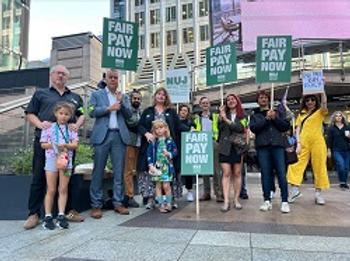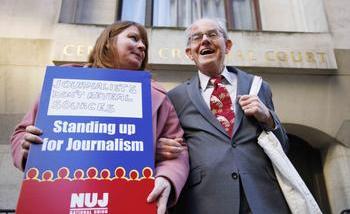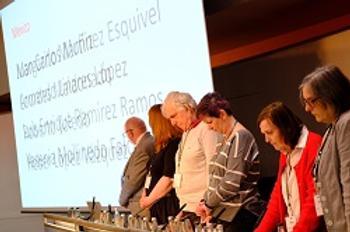DM2023: general secretary's speech
Michelle Stanistreet looks back at the union's achievements over the past two years and assesses the challenges ahead.
Setting the scene for conference, Michelle Stanistreet, general secretary, said:
“We’ve a packed schedule and many debates, important ones that will shape our work over the coming two years. Our financial future, our political independence, our focus and prioritisation of battling for better pay and improved conditions for our members, whether staff or freelance. Our ethical values; our campaigns to protect public interest journalism and our fight to see off the many threats that undermine our work – abuse, harassment, intimidation and attacks; the deployment of pernicious lawfare by the rich and thin-skinned to stymie journalistic investigations and reporting.”
Looking back at the previous two years, she said:“And in the work we’ve done since DM last met, there have been plenty of victories and achievements that exemplify the NUJ’s vim and vigour. You can see that by the sheer detail contained in the Report to the Delegate Meeting. The organising work, the recruitment, the industrial battles with many notable victories and definite collective gains.

“Take our pay dispute across Reach, which ultimately involved 1200 journalists throughout the UK and Ireland – a figure reached on the back of the organising and recruitment that the dispute turbo-charged. Many younger and new members drawn to the NUJ in that times saw the value of collective organisation when the settlement ultimately agreed by members saw significant pay rises on minima rates. The energy and diversity on our picket lines was inspiring. Many new activists have been born out of that work, with new reps and Mother and Fathers of the chapel coming on board. We saw that same spirit more recently, on BBC Local picket lines throughout England when they took 24-hour strike action in mid-March over an ill-thought out strategy that is seeing the BBC take an axe to BBC local radio in a move that cannot be seen as anything other than a monumental act of self-harm.”

From picket line to court room, she described a victory featuring one the three newly awarded Member of Honours, Chris Mullin. “It was standing with Chris Mullin, stepping out of the Old Bailey, that I felt very proud of the legacy of the NUJ’s fearless defence of press freedom and the duty of journalists to protect our sources. With the NUJ’s help and financial backing, Chris had just appeared in court to hear the outcome of a case brought against him that sought to force him to hand over his journalistic notebooks to reveal his source. Rather weirdly it was 31 years before almost to the day, on 14 March 1991, when Chris had left the same Court with the six men finally freed on appeal, after being wrongly convicted of the Birmingham pub bombings. The street wasn’t thronged with cheering crowds this time round, a more modest press pack awaited, but it was still a highly significant victory. More so because the judgement was largely predicated on law resulting from successive cases brought by the NUJ, with this outcome providing fresh safeguards for reporters in the future because the NUJ stands ready to fund and fight these incursions onto journalists and journalism.”

Conference had begun by marking International Workers’ Memorial Day together with a minute’s silence and a chance to remember all the journalists around the globe who lost their lives since the last DM. Delegates held up the names of the 73 around the world killed simply for doing their job. Michelle said:
“The IFJ’s ‘Killed List’ documents the killing of 47 journalists and media workers in 2021 and 67 in 2022. All represent horrific tragedies for their loved ones and colleagues, and one wounds the NUJ particularly badly - NUJ member Dom Phillips, along with his colleague Bruno Pereira, were murdered in a remote region of the Brazilian Amazon, targeted to halt their exposure of the destruction of areas critical for indigenous peoples’ survival. Hosting an exhibition about Dom and Bruno’s work in Headland House, in co-operation with their families, has at least provided a means to disseminate their work. The same exhibition is on show here at Delegate Meeting and I know several branches are keen to also hosting their own event. We can’t undo this tragedy, but we can ensure that Dom and Bruno’s message continues to reach the widest possible audience – we’re also very pleased that his niece will be with us to speak in the international section later today and will join us at our reception.”
She told conference the NUJ can be proud of its international solidarity and work, saying:
“The previous summer was a period of high activity with the US’ departure from Afghanistan in August 2021 bringing chaos. As the Taliban exerted control across the country - culminating in the rapid fall of Kabul - over 140 media outlets were closed and over 1,000 journalists joined those struggling to leave the country – many of them associated with UK and Irish-based news platforms and at heightened risk of reprisals.
“For many weeks, I was in almost round-the-clock contact with the BBC and UK Foreign Office, being kept abreast of measures to secure the safe transport and resettlement of these media workers and their families. This was work that took months, and was enormously stressful for all those journalists and their dependants involved. We have continued to press for support for former BBC staff who have been left without support – including in providing help to a recent legal case challenging the UK government’s failure to make good on its commitments. We also worked closely with the IFJ, who were involved in an even greater number of cases, with scores of journalists contacting us on a daily basis seeking help to escape.
“The NUJ supported the launch of the IFJ’s Afghanistan-specific strand of its International Safety Fund. The response to this by individual NUJ members was unprecedented, and contributed to the IFJ being able to provide help to our two Afghan sister unions - funding that provided grants to individual journalists who had lost their homes, professional equipment, basic food aid, and support for our sister union in Pakistan who was working flat out to support journalists crossing the border seeking help.
“The willingness of NUJ members to demonstrate practical solidarity and support was just as impressive when Ukraine was invaded. NUJ members’ donations now help support six journalists solidarity centres dotted all over Ukraine.
“Our work with the IFJ, and the support of our members for colleagues in Afghanistan and in Ukraine, exemplify the NUJ’s approach when it comes to that vital peer-to-peer support, and our commitment to turning our solidarity into action and practical support. We know from our sister unions that support from the wider journalistic community makes a real difference even in the most challenging of circumstances.”
Friday, the first day of conference coincided with a major good piece of news for the union – the resignation of Richard Sharp, who eventually resigned as BBC chair, so as well as the business of DM, the general secretary found herself carrying out a series of TV interviews and she put out the statement:
“Richard Sharp has shamefully clung to his position as chair for months, whilst all around him could clearly see his time was up, so of course it is a relief and proper that he has now finally resigned. He had lost the dressing room, he had lost the respect of senior figures in the broadcasting industry and besmirched the reputation of the BBC. Now the BBC must move on with a new chair who can help steer the corporation through difficult times and champion public service broadcasting.”
Michelle ended her speech saying:
“Without a secure, financially confident union, however, neither the NUJ, nor anyone else would support important cases such as Chris Mullin’s, or push up our members’ pay, as our colleagues at Reach and elsewhere have done. A free media and a strong voice for journalists and journalism depends on the maintenance of this kind of pressure - it depends on our union and its collective strength. As we move forward into our debates, I hope that it’s the union we want to be, and need to be for our members, that firmly frames our discussions and decisions.”
